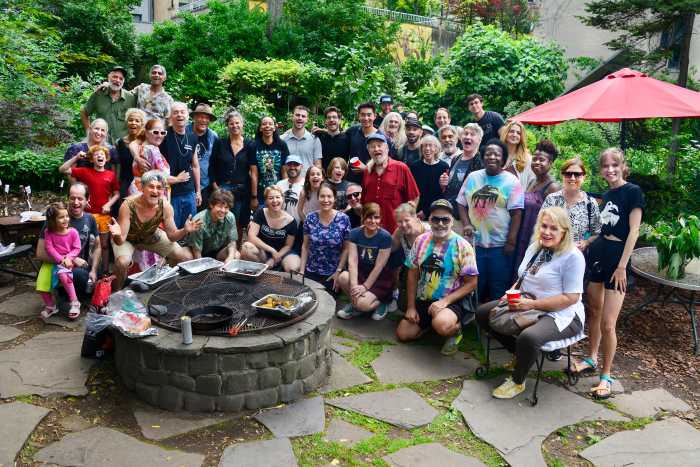By Josh Rogers
Villager file photo
Henry Stern
The color green has been at the center of many recent Hudson River Park debates — namely where to get the needed greenbacks to build the rest of the promised green space. But Henry Stern, a member of the park Trust’s board of directors, splashed some red into the dispute last week, suggesting that some critics of the park’s plans are socialists.
Stern’s remark criticizing a community report that is critical of the Trust’s Pier 40 development plans, provoked a brief cold war (but no shoe banging) last week at the normally staid board meeting — a venue where people are often addressed as “Mr.” and “Ms.” A newcomer to the group and a member of Governor Eliot Spitzer’s administration, Suzanne Mattei, sought détente, pointing out that the report from the Pier 40 Working Group backed capitalist ventures on the 14-acre pier at W. Houston St.
Indeed, the report is not a call for workers of the park to unite, although it did oppose turning the pier over to a single “private developer whose principal motivation is profit” and knocked one plan because it “raises the specter of expensive pay-for-play and the use of park space for extremely profitable day camp uses.”
Selected quotes aside, the report recommends developing the pier incrementally with private developers that the working group believes would generate more money for the park than either the plan to add theaters, restaurants and retail or the one to add a private day camp and field space to the existing public ball fields and parking currently on the pier.
The dust-up began with Stern.
“Some plans are conceived in a capitalist universe and some are prepared in a socialist universe,” he told Marc Ameruso, chairperson of the Trust’s Advisory Council, which set up the working group. Both the council and group are made up of representatives of the nearby community boards, local politicians and waterfront activists.
Stern said the group did not consider the financial difficulty of getting the park built and was not interested in finding a way to make the park self-sustaining, as is the intent of the 1998 law creating the park and the Trust.
“To act in complete disregard for the law will not get you very far,” he said. Stern, the Parks Department commissioner in the Giuliani and Koch administrations, went on to say that the crowds of parents and children who turned up at a Greenwich Village public hearing on the pier plans in May were focused on keeping the pier’s sports field space and were not thinking about the broader issues.
Speaking calmly, Ameruso challenged Stern without a hint of anger in his voice.
“At the public event, there was not a shred of socialism — it was democracy in action,” Ameruso said. “I would take offense to that. It’s not true.”
Stern backed off, saying he did not think the attendees at the hearing — estimated to be between 1,500 and 2,000 people — were socialists. After the board meeting last week, he said there was nothing explicitly left wing in the report either, but he thought the subtext was “We don’t think this park should be self-sustaining.”
Adrian Benepe, the current Parks commissioner and a Trust board member, said it would not be fair if general money was used for Pier 40, because it would come out of funds to help parks all around the city.
Joe Rose, who, like Stern and Benepe, is a mayoral appointee to the Trust, said it was “distressing” that the local group did not factor in the financial pressures on the pier.
Julie Nadel, a Trust board member and frequent Trust critic, said it was unfair for her colleagues to attack the working group when it was not given all of the financial information the Trust had about the two competing Pier 40 plans. Later, she said it appeared the Trust was trying to shift the park’s overall capital expenses to Pier 40 when the pier is only supposed to generate some of the maintenance costs.
Currently, the pier’s parking garage nets close to $6 million annually to cover about 40 percent of the 5-mile-long riverside park’s maintenance. The Trust has not revealed how much money either The Related Companies, which is proposing the entertainment-retail center, or CampGroup/Urban Dove, which is pitching the camp plan, is offering in annual rent. But members of the working group concluded the rent is not likely to be more than $5 million, the minimum amount the Trust asked for in its request for proposals.
“Our sense is neither one came in much above that,” said Arthur Schwartz, the working group’s chairperson, who wrote the report’s first draft and is also chairperson of Community Board 2’s Waterfront Committee. “Why should they? Both are profit-making operations,” he said.
Tobi Bergman, president of Pier Park and Playground Association, which operates a youth sports program on the pier, said he is confident that neither developer offered more operating money than the Trust is currently getting from the parking operation.
No Trust board member disputed the working group’s conclusion on that point.
Schwartz said it is also not clear how much money is needed to fix the 14-acre Pier 40 and how urgently the repairs are needed.
“It’s always been a range [of prices] — a real thorough study has never been done,” he said.
Noreen Doyle, the Trust’s executive vice president, said in a telephone interview that between $20 million and $27 million will have to be spent within the next three years to fix the pier’s roof, piles and part of its facade and acknowledged there is a lot of uncertainty “because it’s not 100 percent black and white.”
“If you get a bad surprise on the piles, that number [$4 million to $7 million for immediate pile work] could just grow exponentially,” she said. The Trust’s last complete inspection of the pier was in 2004, but Doyle said the Trust checks annually to make sure the system in place to slow pile deterioration is working.
Schwartz said if the Trust took the working group’s suggestion for an incremental approach to private development of the pier, it would generate more money for the park and would be less disruptive than the two current competing plans that would draw more traffic. He said the pier is run “haphazardly” and the Trust should hire a business manager to maximize revenue.
For instance, when the Trust let C & K Properties run the parking up until a few years ago, Schwartz said the company’s owners invested in repairs even though they only had a five-year lease. The Trust subsequently took over the parking, but Schwartz said it could probably find an operator willing to pay for repairs if it offered a longer-term lease.
“There are probably a lot of different options rather than giving away the whole pier,” Schwartz said.
Doyle said the Trust is working with Standard Parking on a month-to-month basis and does make short-term changes to increase revenue, but longer-term plans on the pier are on hold because the Trust’s board is focused on a permanent solution.
Most of the local elected officials signed on to the working group report except for City Council Speaker Christine Quinn, whose district includes the pier, and State Senator Tom Duane. Quinn’s spokesperson did not explain her lack of support, but Duane said he agreed with the working group’s view but thought it was “prudent” not to vote for it.
Duane thinks he will have more influence with Spitzer and the governor’s future Trust appointees if he leaves his options open.
“One of those developers may be picked, and if one is, I will work so the plan comes as close as it possibly can to the working group’s recommendation,” he said.
But Schwartz said Duane’s position will be no help.
“You can’t say, ‘I don’t support it, but I’ll argue for it,’” he said. Schwartz would rather work with the report’s supporters, including Congressmember Jerrold Nadler, State Senator Martin Connor and even Schwartz’s chief political foe, Assemblymember Deborah Glick.
A decision on selecting a Pier 40 developer will wait at least a month. Trip Dorkey, the Trust’s chairperson, said farewell to the Trust in May, but he was back running the meeting last week since Spitzer had not picked a successor.
Connie Fishman, the Trust’s president, said things are a “bit delayed. Maybe we’ll pick up steam in September,” she said.
Spitzer’s two ex officio, or automatic, appointments to the Trust, Carol Ash, the state Parks Commissioner, and Pete Grannis, commissioner of the state Department of Environmental Conservation, have skipped the last two Trust meetings. Mattei, who runs D.E.C.’s city office, was sitting in for Grannis last week.
Trust board member Nadel, who chairs Community Board 1’s Waterfront Committee, hopes Mattei’s comment defending the report is a sign things will change.
“She is looking at it with an open and fresh eye and I find that very encouraging,” Nadel said.
And, incidentally, Schwartz said Stern was wrong about the report, but right about one of its authors. Yes, Schwartz, a union attorney and Greenwich Village’s Democratic state committeeman, leans far to the left.
“I am a socialist,” he said. “But the report doesn’t have anything to do with socialism.”
































